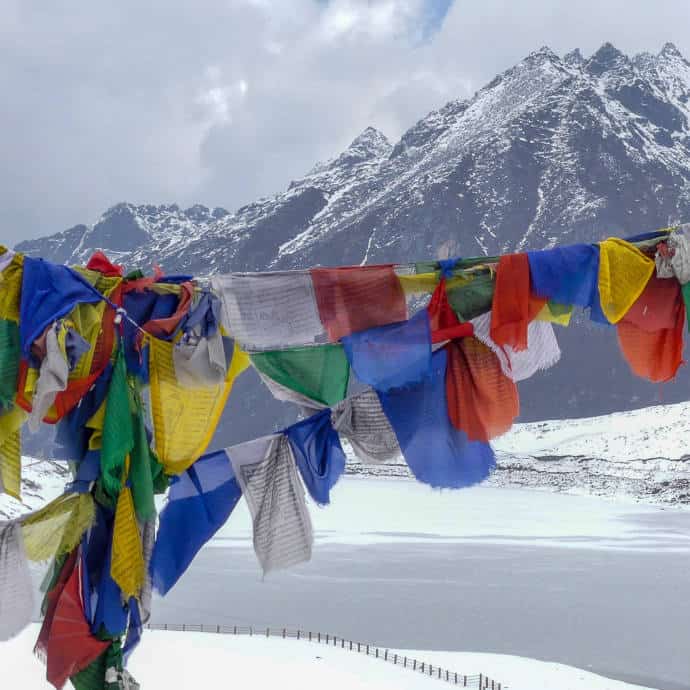All I want for 2019 is anthropology. In my ears. By way of a discussion with an author about their new book. I hope that’s what you also want for the New Year because that’s what we have served up for you in collaboration with New Books in Anthropology.
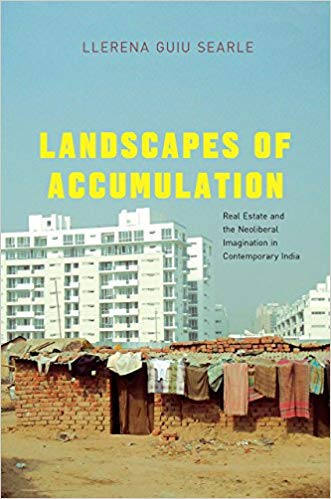 Landscapes of Accumulation. Real Estate and the Neoliberal Imagination in Contemporary India
Landscapes of Accumulation. Real Estate and the Neoliberal Imagination in Contemporary India
by Llerena Searle
(University of Chicago Press 2015)
Few who have visited India in the past two decades will have failed to noticed the sudden and spectacular urban transformation that has taken place in many of its cities. Gated residential complexes with tennis courts and indoor gyms, glitzy office buildings, gleaming five-star hotels, and of course air-conditioned malls have become ubiquitous as the new face of a “new” India, often understood as symbols of a long-awaited global modernity. Getting behind the glittery facade, Llerena Searle’s new book Landscapes of Accumulation: Real Estate and the Neoliberal Imagination in Contemporary India (University of Chicago Press, 2015) shows that these buildings are not built to service consumer India; they are built for real estate developers and international investors for whom Indian real estate has become a profitable speculative gamble. Indian land and buildings are no longer local resources for production or use; they are turning, or more accurately being turned, into internationally tradeable financial assets. How this happens, by whose effort, and against what frictions is the story that the book tells. Searle shows that it is through the narrative of a rising Indian middle class that investments are solicited and a real estate boom created. Through ethnographic attention to the practices and labors of real estate producers, Searle offers an innovative, sophisticated and refreshingly human story of the making of neoliberal India, a story has ultimately shows that the new landscapes that are cropping up all over India are landscapes first and foremost of accumulation. This book will be of interest to readers in urban studies, economics, anthropology, and of course South Asian Studies.
Interview by Aparna Gopalan
Listen here!
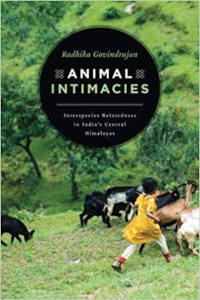 Animal Intimacies. Interspecies Relatedness in India’s Central Himalayas
Animal Intimacies. Interspecies Relatedness in India’s Central Himalayas
by Radhika Govindrajan
(University of Chicago Press 2018)
In what is sure to become a classic, Radhika Govindrajan’s Animal Intimacies: Interspecies Relatedness in India’s Central Himalayas (University of Chicago Press, 2018) mobilizes the thematic of “interspecies relatedness” to explore a variety of human/non-human animal encounters in contemporary India. Animal Intimacies is a path paving work that combines theoretical innovation and playfulness, ethnographic depth, and profound attunement to capturing the aspirations and tragedies of everyday life through the art of narrative. By exploring complex modes of relatedness that bind humans with non-human animals ranging from cows, goats, pigs, and bears, in such varied conceptual and political arenas as animal sacrifice, animal protection, the law, and sexuality and queer desire, this book brings into view a vision of love and intimacy that exceeds and subverts the colonizing grammar of often assumed hierarchies like human/animal, state/citizen, and love/violence. Focused on the state of Uttarakhand, Animal Intimacies mobilizes the theme of interspecies relatedness, with much aesthetic poise, to both uncover and bring into question the operation and cooperation of anthropomorphism, the insidious fantasies of modern state sovereignty, and the enduring violence of patriarchy. In addition to its astonishing erudition, Animal Intimacies is also written with breathtaking clarity and lyrical panache. It will also be a delight to teach in undergraduate and graduate seminars on modern South Asia, theories and methods in anthropology and Religious Studies, Women, Gender, and Sexuality Studies, and Animal Studies.
Interview by SherAli Tareen
Listen here!
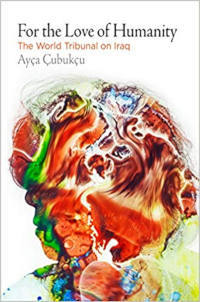 For the Love of Humanity. The World Tribunal on Iraq
For the Love of Humanity. The World Tribunal on Iraq
by Ayça Çubukçu
(University of Pennsylvania Press 2018)
Harkening back to the tribunal on Vietnam once convened by Bertrand Russell and Jean-Paul Sartre, the World Tribunal on Iraq (WTI) emerged in 2003 from the global antiwar movement that had mobilized against the invasion and subsequent occupation of Iraq by a US-led coalition. This decentralized, transnational network of antiwar activists attempted to document and give grounds for the prosecution of war crimes committed by the allied forces. Ayça Çubukçu‘s For the Love of Humanity: The World Tribunal on Iraq (University of Pennsylvania Press, 2018) is a remarkable investigation of the WTI, combining extensive ethnographic fieldwork with close readings of political and legal theory. Çubukçu provides on the ground accounts of the debates and discussions within the WTI, reading them with and as examples of political philosophy in action. The book engages with urgent questions about the challenges and potentials of horizontal, network forms of political action, transnational politics across differences, and perhaps most fundamentally, with the challenges any anti-imperialist politics faces today. Through her careful, incisive analysis, Çubukçu convincingly shows that the language of law and global human rights was not merely cynically appropriated by those who pushed for the war on Iraq. Instead, in complex ways, the ideals of international law and human rights underwrote both the arguments for the war in Iraq and the anti-war praxis of the WTI. The book thus complicates any attempt to, as the author puts it, simply counterpose “law’s empire” with “empire’s law”, raising critical questions about the relationship between law, human rights, imperialism, and cosmopolitanism. Required reading for those interested in the contradictions of imperialism and anti-imperialism today, Çubukçu’s study attests to the promise and peril captured in the phrase “the love of humanity”.
Interview by Kamran Moshref
Listen here!
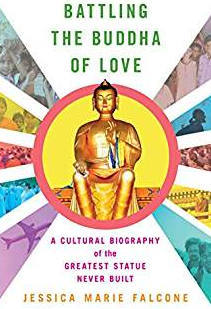 Battling the Buddha of Love. A Cultural Biography of the Greatest Statue Never Built
Battling the Buddha of Love. A Cultural Biography of the Greatest Statue Never Built
by Jessica Marie Falcone
(Cornell University Press 2018)
What can we learn from the anthropological study of projects that are never realized, or of dreams that are never fulfilled? In her new book, Battling the Buddha of Love: A Cultural Biography of the Greatest Statue Never Built (Cornell University Press, 2018), Dr. Jessica Marie Falcone takes her readers on a transnational journey to explore the history of a giant Maitreya Buddha statue that the Foundation for the Preservation of the Mahayana Tradition (FPMT) planned to build in Kushinagar, India. As the title of the book suggests, that statue was never built, as the project became mired in controversy and local opposition. This book traces both the FPMT’s efforts to rally their transnational network of Buddhist students and practitioners around the statue project and the determined resistance efforts of local Indian farmers who were determined not to give up their land without a fight. Along the way, Dr. Falcone offers compelling insights into the concepts of temporality and futurity, grassroots activism in the face of a transnational organization, and the ethics of engaged anthropological practice.
Interview by Dannah Dennis
Listen here!
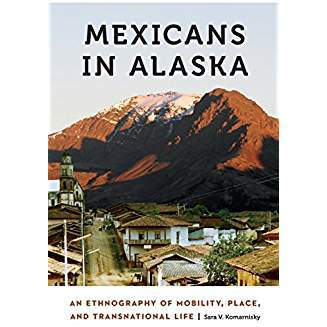 Mexicans in Alaska. An Ethnography of Mobility, Place, and Transnational Life
Mexicans in Alaska. An Ethnography of Mobility, Place, and Transnational Life
by Sara Komarnisky
(University of Nebraska Press 2018)
“There are Mexicans in Alaska?” This was the response Sara Komarnisky heard repeatedly when describing her research on three generations of transnational migrants who divide their time between Anchorage, Alaska and Acuitzio del Canje, Michoacán, Mexico. In her multi-sited ethnography, Mexicans in Alaska: An Ethnography of Mobility, Place, and Transnational Life (University of Nebraska Press, 2018), Komarnisky explores these migrants’ experiences of mobility—across space and time—and the processes by which they get used to this transnational way of life. This engaging book offers a persuasive case for reimagining how we think about immigration, identity, and national boundaries.
Interview by Carrie Lane
Listen here!
Featured image (cropped) by Mike Prince (flickr, CC BY 2.0)

